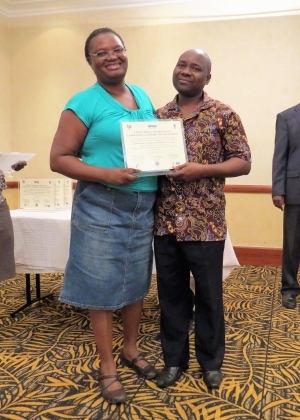
At a December ceremony in Lusaka, Zambia, a group of health laboratory supervisors completed the Certificate Program in Laboratory Leadership and Management, a blended-learning course developed and conducted by faculty and staff the International Training and Education Center for Health (I-TECH) at the University of Washington. The program was implemented in partnership with the American International Health Alliance (AIHA), the U.S. Centers for Disease Control and Prevention, and the Zambian Ministry of Health (MOH).
Effective leadership and management in laboratory settings are critical to providing timely detection, surveillance, and response to infectious diseases. Strengthening these skills has a direct, positive effect on quality of care and the capacity of low-resource countries to reach epidemic control.
The 16 managers, recruited from MOH public health laboratories, participated in nine months of online learning, face-to-face meetings, and mentorship. Courses covered leadership and management skills, and also topics related to implementing diagnostic technology, managing and communicating laboratory information. Participants also designed and implemented a capstone project designed to improve their laboratories’ operations. Online modules were developed with support from the UW Department of Global Health’s E-Learning Program (eDGH).
This certificate program is intended for middle- to senior-level clinical and public health laboratory leaders such as managers and directors, medical technologists, health scientists, and physician scientists interested in improving medical laboratory operations and evidence-based health policymaking. The blended-learning format allows participants to remain employed during their studies.